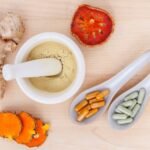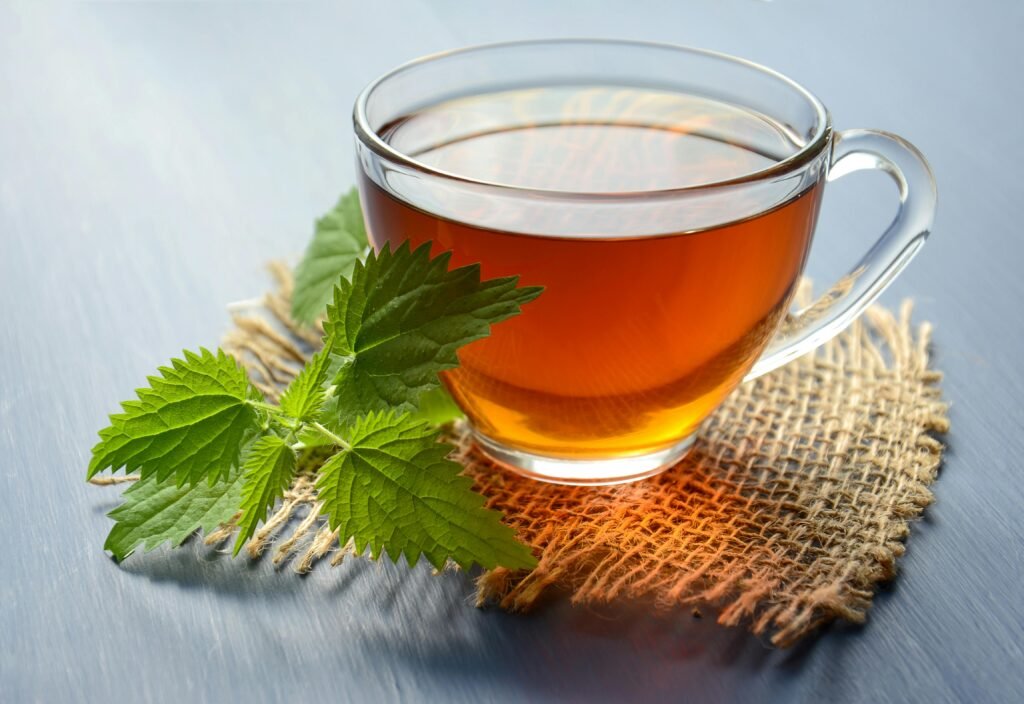For years, you’ve likely been told that high cholesterol is bad. And it’s true that if your cholesterol levels are too high, it can lead to some health complications. That’s why many people are turning to herbs to lower cholesterol naturally as part of a holistic approach to their health. But before we jump in, it’s important to understand what cholesterol is and why managing it is important.
Cholesterol is a fatty substance that’s vital for the body to function. However, similar to many things in life, too much of a good thing can be bad. This is where “good” and “bad” cholesterol comes into play.
Table of Contents:
- Understanding Cholesterol Levels
- Making Lifestyle Changes to Lower Cholesterol
- Exploring Herbs to Lower Cholesterol
- Drinks that Promote Healthy Cholesterol
- Incorporating Herbs to Lower Cholesterol into Your Daily Routine
- FAQs About Herbs to Lower Cholesterol
- Conclusion
Understanding Cholesterol Levels
You likely know there’s good cholesterol and bad cholesterol. But you may not be entirely clear on the difference. High-density lipoprotein (HDL) is “good” cholesterol.
It helps clear the arteries of low-density lipoprotein (LDL), which is “bad” cholesterol. When too much cholesterol builds up in your arteries, it can lead to atherosclerosis, which is a hardening or narrowing of the arteries.
Atherosclerosis increases a person’s risk of heart attacks, strokes, and peripheral arterial disease because it reduces blood circulation. Because high cholesterol often doesn’t have any symptoms, many people are unaware they have it.
The only way to know your cholesterol levels is by getting a blood test from a doctor. Ideally, adults should aim to get their cholesterol checked every 4-6 years.
What Causes High Cholesterol?
While some medical conditions and genetics can play a role, some lifestyle factors impact cholesterol levels. Some of these include:
- Diet
- Weight
- Physical Activity
Saturated and trans fats are two types of dietary fat that can raise your cholesterol. Foods high in saturated fats include:
- Full-fat dairy products
- Red meat
- Processed meats
- Baked goods
- Fried foods
Although tasty, foods with trans fats are some of the worst offenders when it comes to bad cholesterol. This is because they raise bad cholesterol levels and lower good cholesterol. The Food and Drug Administration (FDA) even banned companies from adding trans fats to food products in 2015.
Foods that may contain trans fats include:
- Margarine
- Coffee creamer
- Store-bought cakes, cookies, and crackers
- Frozen pizza
Making Lifestyle Changes to Lower Cholesterol
Eating heart-healthy fats is essential for keeping cholesterol in check. For example, the American Heart Association (AHA) recommends that saturated fat should only represent about 5% to 6% of a person’s daily calorie intake.
These organizations also advise eating foods rich in omega-3 fatty acids and soluble fiber to promote healthy cholesterol. It’s important to eat plenty of fruits, vegetables, and whole grains while avoiding added sugars and highly-processed foods, too.
The Impact of Physical Activity
Regular exercise can also work wonders on your cholesterol levels. A 2019 study involving 425 older adults demonstrated that moderate and vigorous physical activity lowered blood pressure and blood sugar levels.
This study also showed an increase in HDL cholesterol levels. The Department of Health and Human Services recommends that adults do at least 150 to 300 minutes of moderate-intensity aerobic physical activity per week.
They also suggest 75 to 150 minutes of vigorous-intensity aerobic physical activity per week for substantial health benefits.
Other Factors
In addition to maintaining a healthy diet and getting regular physical activity, you can do other things to lower cholesterol and promote heart health.
A 2021 study investigating the role of hydration for metabolic health in older adults found that hydration was associated with higher HDL cholesterol concentrations. So if you aren’t already, now’s a great time to start prioritizing drinking more water.
Exploring Herbs to Lower Cholesterol
Many people have had success adding herbs to lower cholesterol to their diets and health routines. Let’s take a look at some of the top herbs you might consider:
Turmeric
Turmeric is a vibrant yellow spice often found in Indian cuisine. This herb is celebrated for its anti-inflammatory effects and for increasing levels of good cholesterol in some individuals.
A 2017 review study even showed it may work similarly to statins, which are a commonly-prescribed medication that lowers cholesterol levels.
Fenugreek
Fenugreek is a plant with seeds that are commonly used in cooking. A 2020 review found it might help improve cholesterol levels. It’s believed this herb could reduce cholesterol absorption in the gut.
It might also reduce the amount of cholesterol the liver makes, but additional research on this is necessary. According to a 2020 review of studies, fenugreek (Trigonella foenum-graecum) may be an effective medicinal plant for people seeking to improve their cholesterol levels.
Artichoke Leaf Extract
If you’re a fan of artichokes, you’ll be glad to know they contain cynarin. This compound found in artichoke leaf extract might block the production of cholesterol in the liver. But similar to many other herbs and spices on this list, more studies are needed.
A 2021 review study of the available data on the effects of artichoke juice on cholesterol levels reported that it reduced levels of TC, TG, and LDL. This plant may also be helpful for those looking to improve blood levels, but always talk to a doctor before adding something new to your diet.
Holy Basil
Holy basil, which you may know as tulsi, is often found in Ayurvedic medicine. Holy basil is different from the basil used to make pesto. It’s known for its calming properties, but researchers think it might help protect the heart by reducing cholesterol.
A 2016 study showed statistically significant improvements in the values of serum TG, LDL, HDL, and very low-density lipoprotein cholesterol (VLDL) after only 8 weeks. You can also use this herb to lower bad cholesterol levels.
Black Cumin
Also known as black seed, black cumin has antioxidants and anti-inflammatory effects. A 2016 study review of 17 trials that examined black cumin’s effect on cholesterol showed that the oil from these small, black seeds significantly reduced blood serum levels of TC, LDL, and TG.
Drinks that Promote Healthy Cholesterol
Along with incorporating cholesterol-lowering herbs and spices into your dishes, certain beverages are believed to have beneficial effects. More research on many of these beverages is necessary, though. It’s important to enjoy all beverages in moderation and as part of a healthy lifestyle.
Talk to your doctor if you have questions or are currently taking medications for high cholesterol, prescription medications, or cholesterol-lowering supplements.
Green Tea
Green tea is enjoyed for its health properties and is believed to offer several cardiovascular health benefits. Some claim this delicious tea reduces the absorption of cholesterol in the gut, but there isn’t a significant amount of research on humans yet.
A meta-analysis from the American Journal of Clinical Nutrition suggests that green tea significantly reduces total cholesterol, including LDL or “bad” cholesterol, in the blood to 2.19 mg/dL.
Rooibos Tea
Rooibos tea is native to South Africa and is known for its distinct flavor. It contains antioxidants and might be helpful in improving cholesterol. This delicious tea comes in a variety of flavors, so finding one you enjoy won’t be hard.
In a study from the Journal of Ethnopharmacology, participants who drank six cups of fermented rooibos every day for six weeks showed a decrease in LDL of about 0.7 mmol/L and an increase in HDL of about 0.3 mmol/L.
Ginger Tea
If you enjoy ginger, you’re in luck. Ginger is more than a tasty addition to your dishes—it also comes in tea. This warming beverage has been consumed for its potential health benefits for hundreds of years. It may work by reducing the amount of cholesterol absorbed in the gut.
Ginger powder significantly lowered lipid levels compared to a placebo in a double-blind clinical study. If you have high cholesterol levels, this might be a good tea to add to your daily routine.
Peppermint Tea
Peppermint tea is enjoyed after dinner or before bed. However, you can enjoy a cup anytime. Although there’s limited research to support claims it can lower cholesterol, some experts think peppermint can help your body produce bile, which could lower cholesterol.
Another study shows that peppermint tea can lower cholesterol by helping your body produce bile. Try adding a cup of peppermint tea after meals containing foods high in saturated fat.
Incorporating Herbs to Lower Cholesterol into Your Daily Routine
Here are a few examples of how you can seamlessly weave some of these potent ingredients into your meals and beverages. Adding herbs and spices to your food is also a delicious way to flavor your food without reaching for unhealthy additives:
| Herb | How to Incorporate it Into Your Daily Routine |
|---|---|
| Turmeric | Add it to smoothies, soups, stews, or stir-fries. |
| Fenugreek | Use it as a spice for meat or vegetables, or incorporate it into baked goods. |
| Artichoke leaf extract | While you can add the hearts to recipes, it also comes as a supplement. |
| Holy Basil | Steep it as a tea. |
| Black Cumin | Use black cumin seeds in baked goods, or sprinkle them on top of salads, soups, and yogurt. |
FAQs About Herbs to Lower Cholesterol
What is the best herb to lower cholesterol?
Although research results have been positive in some cases, it’s important to note that there isn’t necessarily one single best herb.
What is the best natural remedy for high cholesterol?
As always, making lifestyle changes can have the biggest impact on your cholesterol. However, certain herbs, like the ones listed in this article, may help lower cholesterol when combined with healthy habits. For example, instead of using vegetable oils when you cook, try using olive oil.
What can I drink to flush out my cholesterol?
You can’t flush cholesterol out of your system entirely, but drinking green tea and staying properly hydrated may support healthy cholesterol levels.
What foods flush out cholesterol naturally?
Similar to the previous answer, it’s impossible to “flush” cholesterol. But prioritizing soluble fiber, found in oats, beans, lentils, apples, and pears, can help lower bad cholesterol levels.
Omega-3 fatty acids found in foods like walnuts and fatty fish like salmon and tuna, may also help. A heart attack is another risk factor for people with high cholesterol, so eating a healthy diet can be incredibly beneficial for your health.
Conclusion
Many people are turning to herbs to lower cholesterol levels. This is usually done alongside making healthier lifestyle choices, but it’s vital you talk to a medical professional before incorporating them into your diet. They can help create a safe, customized treatment plan.





